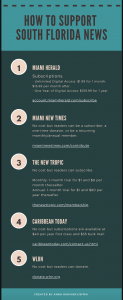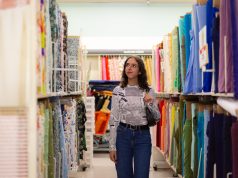Some local newspapers in South Florida are in danger not only because the companies that own them have laid off employees, substantially cut salaries and moved out of their offices, but also because of the coronavirus pandemic.
This presents a threat to local journalism, which produces 50% of original news stories nationally according to Red Bluff Daily. Some believe it is a threat to the nation.
“If newspapers die out, there goes our democracy because we’re not going to know what’s going on,” said Karen Williams Kammer, an attorney at Mitrani Rynor Adamsky Toland Attorneys and former television reporter and editor.
Kammer practiced media law for more than 30 years and defended reporters in libel and privacy suits and subpoenas. She also held many positions at ABC News in Chicago, ranging from the assignment desk to the investigative unit.
“Local journalism is the lifeblood of any community,” she said. “I think it’s in a way a civic duty to support your local newspaper and to listen to your local radio station and to watch your local television station, whichever one you choose.”
Not only are local newspapers in danger for economic reasons, according to Kammer, but also because readers can now avoid paywalls and subscriptions by getting their news — which can lack context or even be provided by Russian bots — for free online or on social media platforms.
As a result, reporters get laid off by the companies that own the news organization for which they work.
Zach Schlein, a former reporter and freelancer for Miami New Times and now an editor for The New Tropic, was laid off by Voice Media Group, the company that owns New Times and several other papers.
He said that before he left, his salary was cut by 25%, and then a week after the pandemic struck in mid-March, he was without work.
“Miami New Times was the first professional journalism gig I ever had,” he said. “My first freelance story was published in December 2015. It was pretty much the place where I launched my journalism career.”
Miami New Times profits not from reader subscriptions but from advertisements of nightlife, concerts, bars and other event promotions. However, ever since the pandemic started, there hasn’t been as much support from advertisers, Schlein said.
“In the face of a lack of advertising revenue that local publications don’t have, we’re really depending on readers to open up their hearts and wallets to us in order to be able to survive,” he said.
Jerry Iannelli, former Miami New Times reporter and current writer for The Appeal, decided to leave the newspaper after nearly five years.
“We all had our salaries cut off because of the coronavirus pandemic. My salary was slashed 25% overnight and there wasn’t a lot of money to begin with,” he said. “It was really hard on all of us. They were warning us that more cuts and layoffs were coming, which is true. After I left, they cut other people.”
Glide over the map with your mouse to see which news media are owned by two hedge funds, Alden Global Capital and Chatham Asset Management, and a private media company, Voice Media Group. Note: not all news media are shown in the map.
Another newspaper that has been under threat is the Miami Herald, whose parent company McClatchy declared Chapter 11 bankruptcy. Soon to take over from McClatchy is a hedge fund called Chatham Asset Management.
Another confirmed bidder for the auction was Alden Global Capital, which was called “the grim reaper of American newspapers” and the “hedge fund vampire that bleeds newspapers dry” by Vanity Fair in February.
“We’ve seen what hedge funds have done throughout the news industry, and they have a track record of cutting staff and costs. I mean, that’s the nature of a hedge fund – it’s not to serve the community but to accumulate wealth,” said Aaron Leibowitz, the municipal government reporter for the Miami Herald.
Leibowitz has been a reporter for the Herald since October of last year. He, along with other reporters, have joined the OneHerald union to protect labor rights and working conditions of reporters from the Herald and El Nuevo Herald.
“I think that we have to continue to fight for strong local journalism here because it’s not something we should take for granted,” he said. “It needs support and it needs money, frankly. We need subscribers, we need investment from the community.”
The Miami Herald moved out of its Doral office after it terminated its lease. According to Leibowitz, employees will be working from home until the end of the year, when a new office is promised.
Caribbean Today, a monthly news magazine that has covered issues from South Florida and Caribbean countries for more than 30 years, has not experienced the same challenges as many other newspapers.
Peter Webley, the publisher and owner of Caribbean Today, said he has not laid off or cut the salaries of any of his employees during the pandemic.
“We have a very loyal following and a very fortunate partnership with our business associates, such as Publix and FPL, and they have seen the value of Caribbean Today over the years and fortunately they stuck with us through time,” he said.

Leslie Ovalle, a multimedia producer for WLRN, a local nonprofit public radio and television station, said that readers and listeners are important to keeping local journalism alive.
Aside from donating and subscribing to local news media, members of the community can share feedback and stories with journalists on social media and email.
“We want nothing more than to hear from our own community and have feedback and conversations with them just to know how best we can serve them,” Ovalle said.
Webley reinforced the importance of local journalism: “Politics are local, and news has to be local. If we’re not covering certain things, a lot of other news will be swept under the carpet and a lot of dishonesty will develop, because there’s nobody to monitor what is going on. And we as people, should not, cannot, and must not allow that to happen.”


































